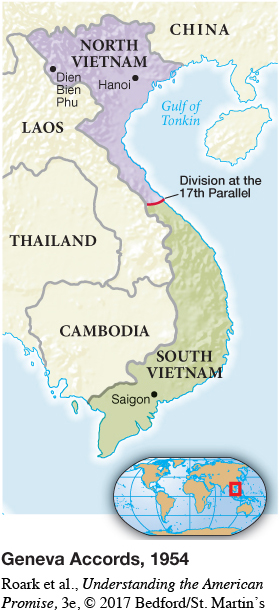Applying Containment to Vietnam
A major challenge to the containment policy came in Southeast Asia. During World War II, Ho Chi Minh and his nationalist coalition, the Vietminh, fought both the occupying Japanese forces and the French colonial rulers. In 1945, the Vietminh declared Vietnam’s independence from France, and when France fought back, the area plunged into war. Because Ho declared himself a Communist, the Truman administration quietly began to provide aid to the French. American principles of national self-determination took a backseat to the battle against communism.
Eisenhower viewed communism in Vietnam much as Truman had regarded it in Greece and Turkey. In what became called the domino theory, Eisenhower explained, “You have a row of dominoes, you knock over the first one, and what will happen to the last one is the certainty that it will go over very quickly.” A Communist victory in Southeast Asia, he warned, could trigger the fall of Japan, Taiwan, and the Philippines. By 1954, the United States was paying 75 percent of the cost of France’s war, but Eisenhower resisted a larger role. When the French asked for American troops and planes to avert almost certain defeat in the battle for Dien Bien Phu, Eisenhower, remembering the Korean War, refused.

Dien Bien Phu fell to the Vietminh in May 1954, and two months later in Geneva a truce was signed. The Geneva accords recognized Vietnam’s independence and temporarily partitioned it at the seventeenth parallel, separating the Vietminh in the north from the puppet government established by the French in the south. Within two years, the Vietnamese people were to vote in elections for a unified government. Some officials warned against U.S. involvement in Vietnam, envisioning “nothing but grief in store for us if we remained in that area.” Eisenhower and Dulles nonetheless moved to prop up the dominoes with a new alliance and put the CIA to work infiltrating and destabilizing North Vietnam. Fearing a Communist victory in the elections mandated by the Geneva accords, they supported South Vietnamese prime minister Ngo Dinh Diem’s refusal to hold the vote. [[LP Spot Map: SM27.02 Geneva Accords, 1954/
Between 1955 and 1961, the United States provided $800 million to the South Vietnamese army (ARVN). Yet the ARVN proved grossly unprepared for the guerrilla warfare that began in the late 1950s. With help from Ho Chi Minh’s government in Hanoi, Vietminh rebels in the south stepped up their attacks on the Diem government. The insurgents gained support from the largely Buddhist peasants, who were outraged by the repressive regime of the Catholic, Westernized Diem. Unwilling to abandon containment, Eisenhower left his successor with a deteriorating situation and a firm commitment to defend South Vietnam against communism.
Understanding the American Promise 3ePrinted Page 773
Section Chronology